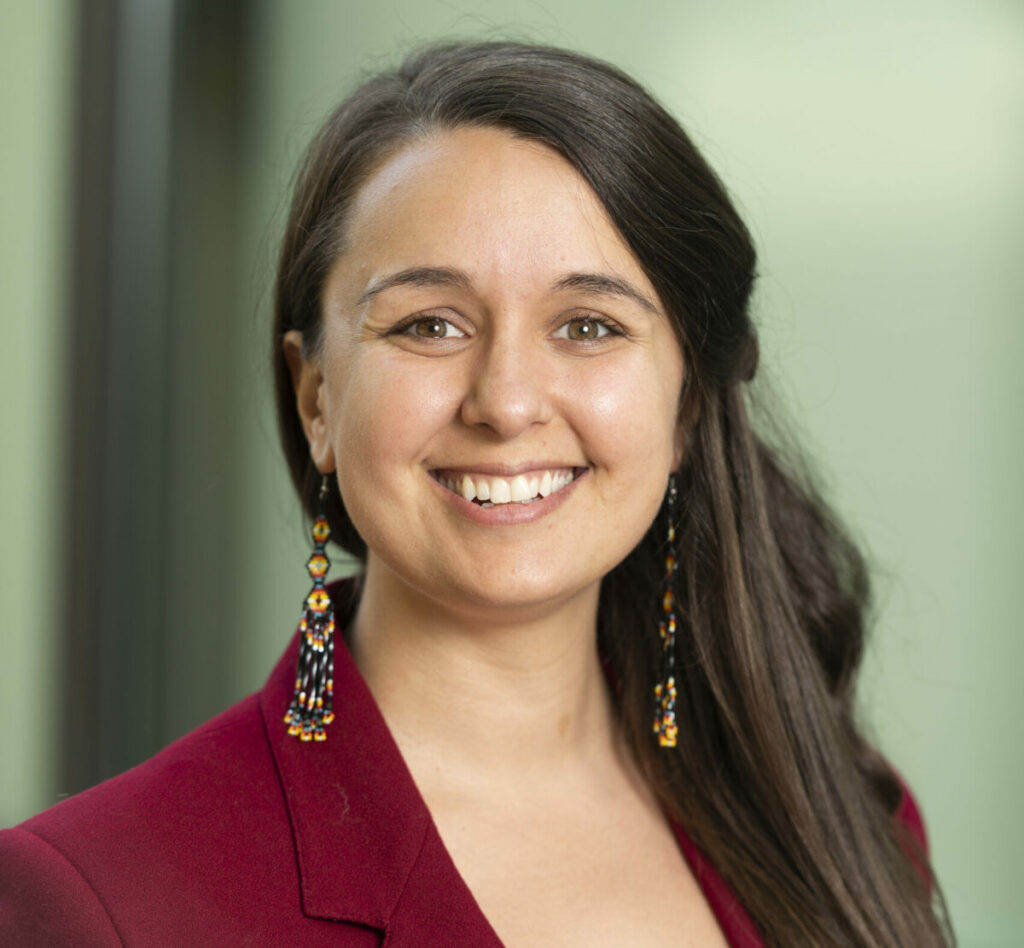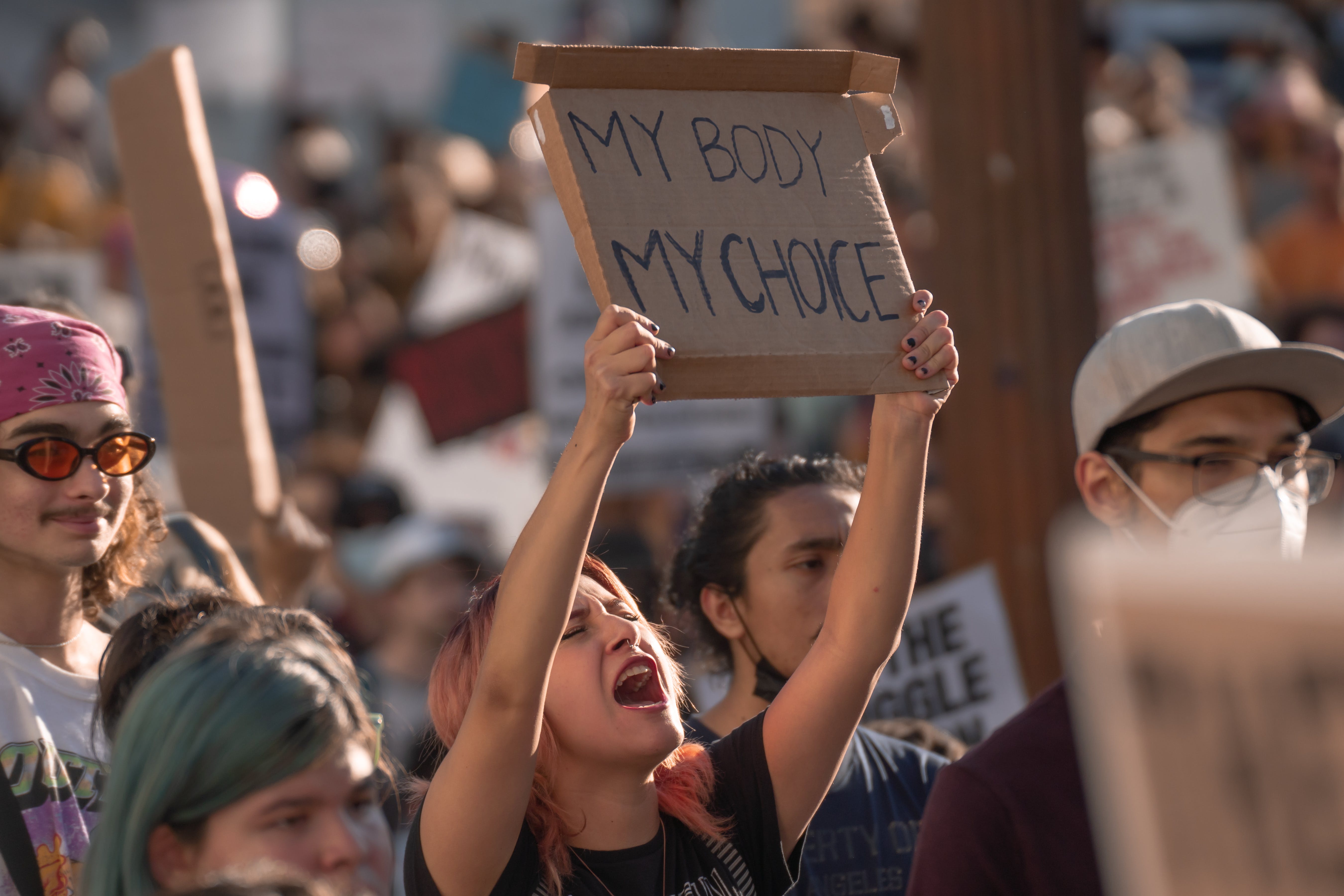Britt Gondolfi thought she’d always be anti-abortion; now she wants to reframe the debate
Bioneers | Published: November 1, 2023 Women's Leadership Article

There are two moments that Britt Gondolfi can point to that changed her from being staunchly anti-abortion to someone willing to stake a political campaign on a woman’s right to choose, running for State Senate on a pro-abortion platform in rural southern Louisiana.
Such a shift had a lot working against it. Gondolfi is the daughter of a teenage mother, and her father is an Evangelical Protestant. She grew up attending Catholic school and going to church on the weekends. When she was in high school, she even played the part in an Evangelical theatrical production of a woman who’d had an abortion and was narrowly saved from eternal damnation.
“I thought for sure my whole life was set for me to just be Christian, pro-life,” Gondolfi said. “I thought, how could anyone have an abortion?”
But then, when she was 19, Gondolfi got pregnant. She was in her first year of college at the time and supporting herself by working as a maid and back waitress. While rolling silverware at the restaurant, she confided her situation to her coworker, a woman about 10 years her senior. Instead of the judgment that her religious upbringing had taught her to fear, she was met with understanding. The woman told Gondolfi to trust herself when deciding what to do.
“I was telling her my circumstances and where I was at, and she was like, ‘Look, you’re not a bad person. You’re just dealing with a bad situation right now, and you’re trying to make the best decision that you can,’” Gondolfi said. “…She wasn’t judgmental. She didn’t shame me.”
Gondolfi said the empathy her coworker showed her was the first of two moments that would change her mind about abortion. The second would come not long after. After considering her age, her difficult financial situation, her desire to finish school, and the fact that neither she nor her boyfriend felt ready to raise a child, Gondolfi decided to have a medical abortion. After she was sent home with the medication, the thing that shocked her most was how she felt.
“I was looking down a path of my life that I did not want to go down,” she said. “And when I was given the opportunity to not go down that path, I felt tremendous relief. And that shocked me because I was told my whole life that I would feel shame and guilt and remorse, and that I would never be able to cope or function, and that my relationship would be doomed.”
Gondolfi, who would later have a daughter at the age of 27, once she felt she was ready, did not feel any of those things when she made her decision to have an abortion, only the relief. This was before the U.S. Supreme Court ruling that took away the constitutional right to an abortion, before Louisiana’s trigger laws created some of the most restrictive abortion bans in the country. At the time, no matter their state of residence, women still had the right to choose whether they wanted to become parents, and Gondolfi embraced this right.
Her experience shifted her perspective so much that she decided to work at a women’s clinic, Feminist Women’s Health Center in Atlanta, where for two years she helped women fill out their intake paperwork. In the process, she ended up being the confiding ear to hundreds of stories. She saw firsthand what the statistics supported: The stereotypes politicians often conjure of those who have abortions are not the reality. Instead, Gondolfi said many of the people who came for abortions already had children. They were people who knew the time and expense of raising a child, and they made a carefully considered decision not to have another.
“The stereotypes of the hypersexual, unsafe, irresponsible woman who just uses abortion as birth control has been used to fuel this culture war, where they have politicized the most personal thing that can happen to someone — which is to be pregnant and to not be able,” Gondolfi said.
Statistically, the majority of women who get abortions already have at least one child and have never had an abortion before. Specifically, the most recent national health data from the Centers for Disease Control and Prevention indicate that six in 10 women (61%) who had an abortion in 2020 already had at least one child. The majority of abortions (58%) were women who had never had an abortion before.
As far as age demographics, the majority of women who had abortions (57%) were in their 20s. About three in 10 (31%) were in their 30s. Teens ages 13 to 19 accounted for 8%, while women in their 40s accounted for 4%. Regarding when and how abortions occur, about 81% of abortions were performed at less than 9 weeks gestation, and nearly all, or about 93%, were performed at less than 13 weeks gestation. Most abortions, about 53%, were medical abortions, a percentage that has been increasing steadily since the pill for inducing abortion was introduced in 2000.
Gondolfi’s perspective had not only shifted but begun to expand. She saw the reality that numbers often cannot tell, the particular challenges and circumstances people were facing when making such difficult decisions. She said that included financial hardship, medical conditions, and fetal anomalies, as well as those who were the victims of rape and domestic violence. It would be an experience that stuck with her.
About 11 years later, in 2022, when the Supreme Court made its fateful decision to overturn Roe v. Wade, which had upheld the constitutional right to abortion for nearly half a century, Gondolfi was in law school at Loyola University in New Orleans. While she was in a class studying constitutional rights, one was taken away. Now in her early 30s and happily raising her daughter back in her home state, she decided she needed to speak for the teenager she had been and for all the women she’d encountered who had faced the same choice and made the decision that was best for them at the time.
Though she knew her odds, she decided to run as a Democrat seeking to unseat Republican Beth Mizell, an incumbent candidate for the Louisiana Senate’s 12th district, a rural district considered a Republican stronghold. Mizell was supportive of Louisiana’s restriction abortion law, which does not make exceptions in the case of rape or incest. Despite the political landscape she faced, Gondolfi said she could not let Mizell’s position stand unopposed.
“I knew I had a snowball’s chance in hell of beating her, but someone had to be her opposite,” she said. “There had to be an alternative choice.”
For Gondolfi, who worked for years in the service industry and later as a teacher, abortion was not a single issue. It related to so many others — universal preschool, strong public schools, increasing the minimum wage, protecting and expanding Medicaid — that she knew were among the many factors people weighed when deciding whether they were able to raise a child. She built her platform on those and other issues and refused to concede her stance of trusting women to the less ambitious efforts to add more exceptions to Louisiana’s near-total abortion ban.
“I refuse to parse it, and I refuse to fight for exceptions,” she said. “Because when we are asking for exceptions, we are still authorizing the state to have the permission to dictate parenthood to women when they say they cannot. And if we’re going to fight for exceptions, then we’re basically fighting for abortion courts — creating a circumstance whereby a woman will have to go before a judge to prove that she has been raped, to prove that there is an issue of domestic violence, to prove that there’s some true danger to her physical health.”
In the end, even if such exceptions were granted, she said the paternalistic relationship between the government and a person’s womb would persist. She said she wanted to change the way people talk about abortion, because she feels the term “pro-life” is an easy moral mass to hide behind, but it’s so much more nuanced than that.
“It’s refusing to use the language that’s been carved out and handed to us, because it doesn’t even begin to touch on how complicated this is,” she said. “And no one should be able to hide behind pro-choice or pro-life.”
Throughout her campaign, Gondolfi heard from women who told her their abortion stories, all of them via private message or text, indicating that the fear of judgment Gondolfi was raised with still prevailed. And the challenges Gondolfi faced would go beyond the abortion issues. She said Louisiana is a difficult state for Democrats to garner campaign support, and candidates are often left on their own to fundraise because many see the state as a lost cause. Combine that with low voter turnout and a third candidate that split the Democratic vote, and the incumbent fended off the primary challenge in October with comfortable margins.
While Gondolfi said she is, of course, disappointed by the outcome, she is still throwing her weight behind other Democrats still in the running and hopes the party can make changes that give it a better chance in future elections.
The book on the issue of abortion also remains open. Recent statistics show that the number of abortions nationwide in the year since the Supreme Court overturned Roe v. Wade did not decrease, and instead remained relatively steady (increasing by about 2,000 abortions), but that more people traveled to other states to obtain abortions, according to the Society of Family Planning’s ongoing tally of abortions. Louisianan Governor Elect Jeff Landry, currently the state’s attorney general, has indicated his intent to pursue punishments for those who travel to other states to obtain abortions.
For her part, Gondolfi will keep talking about it, working to change the language around abortion so that it’s framed for what it truly is — a person’s right to control their own body and their own life. Gondolfi, who has worked for Bioneers for the past five years, where she does project management for the Rights of Nature program, encouraged others to run for office if they felt the call. Gondolfi knows firsthand that shifts can happen.
“I would pray that people not forget women in the South,” she said. “We’re not a lost cause.”


